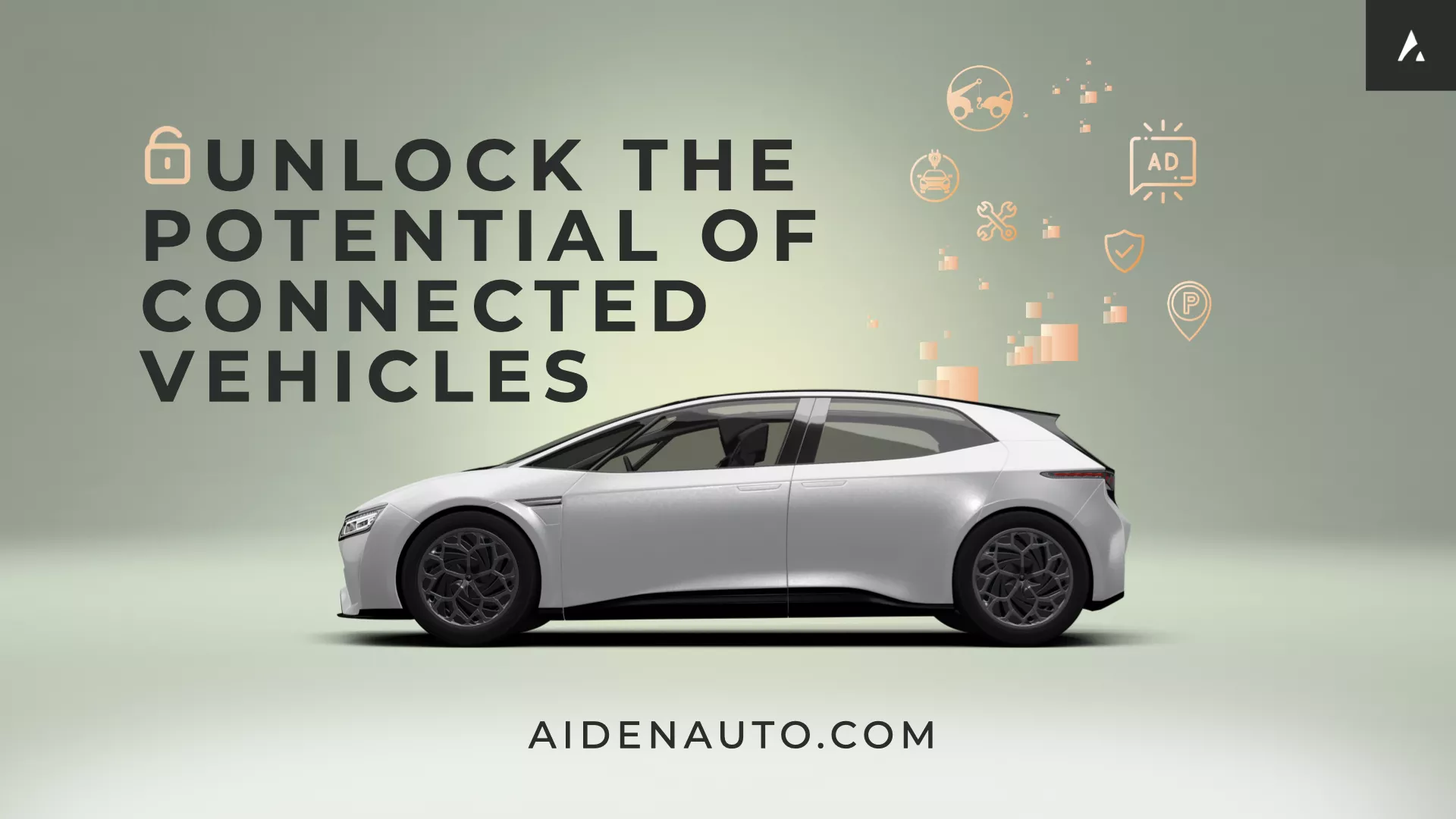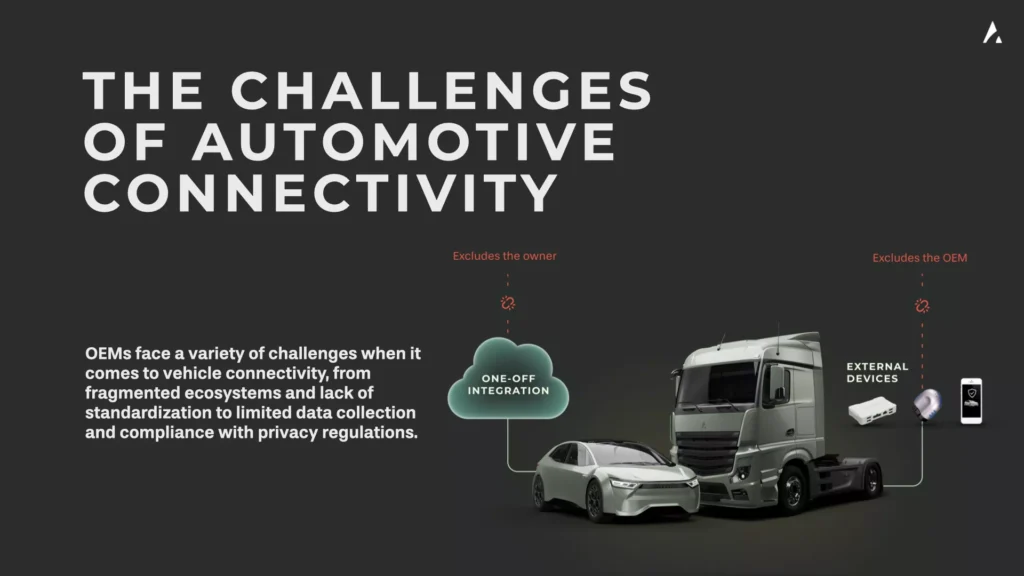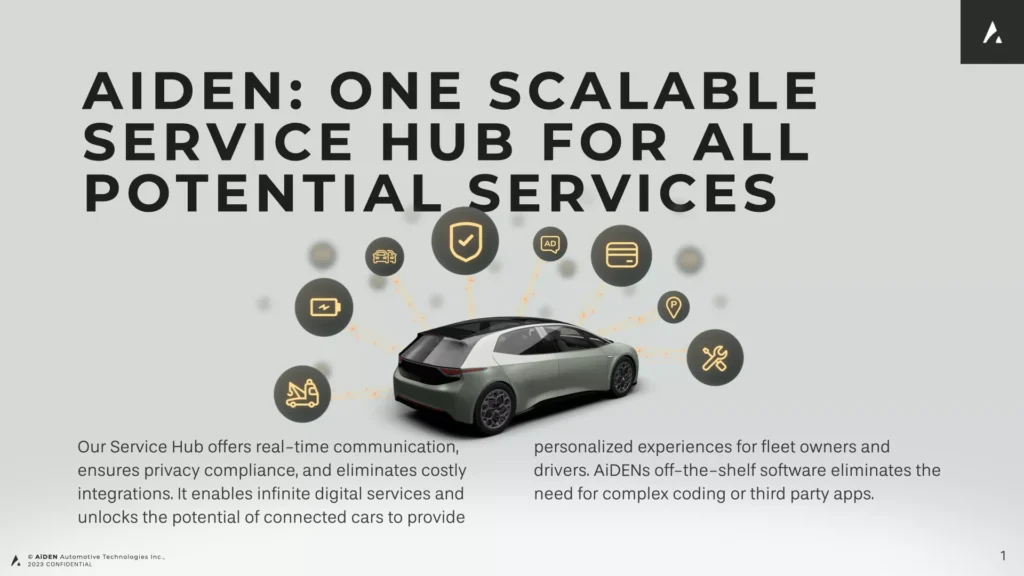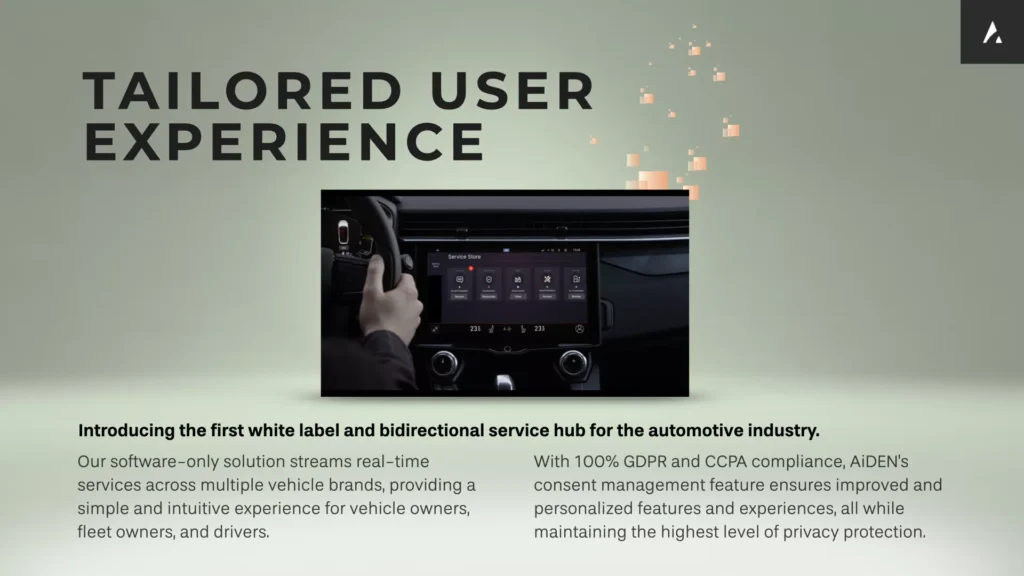






From EVs and batteries to autonomous vehicles and urban transport, we cover what actually matters. Delivered to your inbox weekly.

Cars were slated to be “smartphones on wheels.” But decades of that promise left drivers with clunky infotainment screens, half-baked app stores, and subscriptions nobody asked for.
As a result, we now have a connected car market that burned billions yet delivered little value.
The issue goes far beyond bad UX. Automakers face fragmented platforms, high integration costs, and rising data privacy pressure. Every attempt to bolt services into the dashboard runs into the same wall – it’s too slow, too expensive, and too risky.
That’s where AiDEN Auto comes in. Spun out of Volvo’s software labs and now operating between Sweden and California, the startup has built a consent-driven hub that finally connects cars with services in a way that works for OEMs, drivers, and providers alike.
It’s the missing layer between the vehicle and the digital services drivers actually want – from charging to insurance to roadside help – built on transparency and user control instead of hidden trade-offs.
For more than two decades, “connected car” has been one of the industry’s favorite buzzwords. Billions poured into in-dash systems, app stores, and OEM-branded platforms.
Yet ask most drivers today what they use, and the answer is either CarPlay or Android Auto.
The rest? Mostly ignored.
The problem isn’t demand. Drivers want seamless charging, smarter insurance, and reliable roadside support. The problem is supply. Each automaker built its own walled garden, forcing service providers to negotiate separate integrations, absorb heavy costs, and wait through years-long rollout cycles.
That fragmentation killed scale before it could begin.
Then came the privacy crunch. Regulators tightened rules, and consumers pushed back against the idea that car data was just another stream to be harvested. Without clear consent and transparency, most “connected services” became non-starters.
The result is the paradox. Cars are more connected than ever in hardware terms – loaded with sensors, LTE, and soon 5G – but the driver’s experience hasn’t caught up. The tech exists, but the business models don’t.

AiDEN is betting that the missing layer isn’t more hardware in cars, but a smarter bridge between vehicles and the services drivers actually want.
At the core is the AiDEN Hub, a bidirectional platform that connects directly with OEM systems and normalizes over 160 data points in real time. Battery status, mileage, charging sessions, diagnostics, all cleaned up and streamed in a way that third-party apps can use instantly.
On top of that sits a no-code deployment layer for Android Automotive OS, which means service providers can launch in-car apps without a multi-year OEM integration project. Insurance, roadside assistance, charging networks, fleet tools… All can plug in once, then scale across brands.
What makes it work is consent. Every data flow requires the driver’s explicit opt-in, with transparency on what’s shared and why. It’s a pivot away from the surveillance-style models that doomed earlier connected car platforms, and closer to what consumers already expect from app stores.
AiDEN calls this a “privacy-first app store for cars.” For OEMs, it’s a way to finally monetize connected services without owning the entire stack. For developers, it’s a distribution channel that actually scales. And for drivers, it’s the promise that their car can do more than just mirror their phone.

So what does this look like when you’re behind the wheel?
With AiDEN’s system active, the car becomes a hub for everyday services. A driver can:
All of it happens inside the car’s native interface, not through clunky phone mirroring. Drivers see which services are available, what data each one needs, and can give or revoke consent with a couple of taps.
That clarity is the real differentiator. Instead of data being siphoned off silently in the background, AiDEN makes every exchange visible and optional. The result is convenience and choice, without the hidden trade-offs that soured drivers on past connected-car platforms.

AiDEN’s pitch is simple. Let everyone win without squeezing the driver.
For automakers, the platform opens up new recurring revenue. Instead of nickel-and-diming drivers for in-dash features or locking them into subscriptions, OEMs monetize by curating services – energy, parking, insurance, maintenance – that plug seamlessly into the car.
For service providers, AiDEN removes the friction of custom integrations. One API unlocks access to drivers across multiple brands, so a charging network or insurance carrier doesn’t have to negotiate or rebuild for every OEM.
For drivers, the upside is convenience without added fees. They choose which services to activate, keep control over their data, and don’t see the price of every small feature tacked onto their bill.
The positioning matters. AiDEN isn’t trying to become another walled-garden “super app.” It’s a neutral layer that enables both OEMs and service providers to do business, while keeping the customer relationship intact.
The platform is already being tested and proven with some of the biggest names in mobility.
At Volvo Trucks’ CampX innovation hub, AiDEN is piloting its integration layer across fleets in both Europe and the U.S. The goal is to show how connected services can scale in commercial transport, where downtime and fragmented apps cost serious money.
With Lynk & Co, the demo goes straight to the driver experience. In a single interface, users could park, charge, and even order goods without leaving the in-car UX – and that’s with no app juggling and no QR-code scanning.
On the infrastructure side, HERE Technologies has plugged AiDEN into its navigation stack, enabling real-time hazard alerts and better routing. Pair that with HAAS Alert, which feeds in digital warnings from emergency vehicles, and the platform starts to look like a safety multiplier as well as a convenience layer.
Commerce is also on the table. Mavi.io brings food and retail ordering into the dash, while Treads turns tire replacements and maintenance into a subscription service that lives directly inside the vehicle.
Taken together, these partnerships are proof of AiDEN’s positioning. It’s not another app, but a connective layer that lets multiple industries deliver value inside the car. It’s early, but the signal is very clear – OEMs, fleets, and service providers are ready to test-drive a neutral marketplace.
AiDEN’s credibility comes straight from the people building it.
Niclas Gyllenram, co-founder and CEO, spent years at Volvo Cars, where he led the rollout of the world’s first Android Automotive OS system. That gave him a front-row seat to the complexity of in-car software – every app is its own silo, every update creates new friction, and OEMs rarely get a clean way to control the ecosystem. AiDEN is, in many ways, a direct answer to the problems he saw up close.
On the commercial side, Todd Thomas, co-founder and CRO (until recently, now on the Board of Advisors), brings decades of experience in connected services, business development, and scaling partnerships. And his role in this venture is critical. if AiDEN is the connective tissue, it needs not only to work technically but also to attract the service providers, fleets, and OEMs that give it value.
The company also benefits from its dual DNA. With roots in Scandinavia and a base in California, AiDEN combines the design-first mindset and regulatory rigor of the Nordic mobility scene with the speed and scale of Silicon Valley’s startup culture. That mix helps them pitch equally well to European OEMs navigating strict data rules and to US players looking for fast-moving innovation.
Both Niclas and Todd emphasize privacy, trust, and transparency as part of AiDEN’s core brand identity. In a market where drivers are increasingly skeptical about how their data is used – and regulators are watching closely – that stance could be a competitive differentiator as much as a philosophical one.
AiDEN has raised about $6.1 million to date, giving it the runway to move from pilots to scale. And their backers are strategically aligned with the mobility services ecosystem AiDEN wants to power.
Early support came from angel investors, including IF Insurance, a heavyweight in the Nordic market. That kind of partner matters when your product involves payments, liability, and data security inside cars.
In 2024–25, AiDEN closed a $4.2 million seed round, led by Nuri Venture Partners, with participation from Tengro, Band of Angels, Mentors Fund, and Conxcity.
What this mix tells us: VCs with experience in mobility, insurance, and smart-city infrastructure, rather than a scattershot group of generalists.
This positioning sends a clear signal. AiDEN is building the rails for B2B services where OEMs, fleets, and insurers all have skin in the game. By tying its capital to players embedded in those sectors, AiDEN is stacking both distribution and credibility.
The timing for AiDEN couldn’t be sharper.
OEMs are under pressure to monetize connected services. Cars are rolling computers, yet most automakers are leaving money on the table by scattering services across fragmented apps and clunky integrations. AiDEN offers them a way to unify and monetize without building everything in-house.
At the same time, regulators are tightening the screws. Between GDPR in Europe and CCPA in California, drivers have a legal right to transparency and control over their data.
That puts carmakers in a bind. They need services to drive revenue, but they can’t risk violating privacy laws. AiDEN’s consent-first architecture is built for exactly that gap.
Then there’s the driver experience itself. People want seamless services. They (we) want to pay for parking, schedule charging, order goods without juggling apps or surrendering their data blindly. AiDEN promises to simplify the UX while keeping drivers in control, a rare combination in the current market.
And finally, the competitive white space is wide open. Big tech has tried to extend its platforms into the car, but no one has built a neutral, consent-based marketplace that works across OEMs, fleets, and service providers.
That neutrality may prove to be AiDEN’s moat – trusted by drivers, viable for regulators, and valuable for automakers who can’t afford to cede control to Silicon Valley.
AiDEN’s roadmap moves in clear stages.
In the near term, the focus is on converting pilots with Volvo Trucks, Lynk & Co, and other early partners into full production deployments. Those deals would prove that the platform isn’t just a sandbox project but an operational backbone for OEMs.
The mid-term goal is to broaden the service catalog. Today it’s parking, charging, commerce, and safety alerts. Tomorrow it could be insurance integrations, fleet management, and retail commerce delivered directly through the car interface. Each layer makes the ecosystem stickier for OEMs and more valuable for drivers.
Looking further ahead, the long-term vision is ambitious – AiDEN as the neutral middleware that links vehicles, services, and infrastructure across markets. If fleets, retailers, and OEMs all plug into one layer, the result is a true operating system for consent-driven mobility.
And what’s the big picture? If autonomy made cars drive themselves, AiDEN could be the one to finally make them connected. Not in marketing jargon, but in a way that unifies services, protects privacy, and unlocks real value for the industry.
Want to learn more about the company? Watch the Charging Stack episode where we hosted Niclas Gyllenram, CEO of Aiden, for a 50-minute conversation about AiDEN and the future of connected cars!